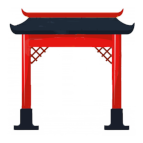Memory phrase for the character: 克
克
Meaning
to subdue, to overthrow, gram Pronunciation kè Explanation Top: ten 十, below: older brother 兄 (A big mouth 口 on feet 儿)
Mnemonic
Show English
(The inferior must leave the battle-field, such as to run away using the legs:) The old 古 gets legs 儿, if it is subdued. Radicals
古
ancient, old, former Originally derived from the picture of a skull, hence "old". But the idea of a burial mound is also helpful.
儿
legs Simplified from 兒 with the meaning 'son'. In the explanations used as 'two legs'.
兄
elder brother
Vocabulary
2144 5204 5488 5663 7349 7530 7724 7725 8622 4902 4902
克服 kè fú
(try to) overcome (hardships etc); to conquer; to put up with; to endure
顿涅茨克
Dùn niè cí kè
Donetsk
圣潘克勒斯站
shèng Pān kè lēi sī zhàn
Saint Pancras (London railway station)
阿克赛钦
Ā kè sài qīn
Aksai Chin, a disputed region in the Tibetan plateau
贝娅特丽克丝
Bèi yà tè lí kè sī
Beatrix (name)
鄂霍次克海
È huò cì kè hǎi
sea of Okhotsk
马克沁机枪
Mǎ kè qìn jī qiāng
Maxim machine gun
马克沁 Mǎ kè qìn
Sir Hiram Maxim (1840-1916), American British inventor of the Maxim machine gun
盎格鲁萨克逊
àng gé lǔ sà kè xùn
Anglo-Saxon
捷克斯洛伐克
Jié kè Sī luò fá kè
Republic of Czechoslovakia (1918-1992)
捷克斯洛伐克
Jié kè Sī luò fá kè
Republic of Czechoslovakia (1918-1992)
捷克斯洛伐克
Jié kè Sī luò fá kè
Japanese kanji, please follow this link .
List of the characters | List of the radicals
